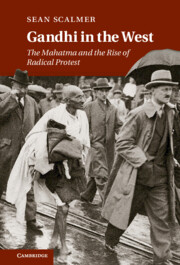Conclusion
Published online by Cambridge University Press: 03 May 2011
Summary
Mohandas Karamchand Gandhi famously rejected the concept of ‘Gandhism’: ‘I have conceived no such thing as Gandhism. I am not an exponent of any sect. I never claimed to have originated any philosophy. Nor am I endeavouring to do so.’ Later, he was more emphatic: ‘I love to hear the words: “Down with Gandhism.” An “ism” deserves to be destroyed. It is a useless thing.’
These are claims and aspirations ultimately spurned by history. Today, Gandhi persists as a symbol of anti-colonial struggle and somatic discipline, a prophet of love and a technician of protest. His image adorns major advertisements and his life story is the subject of book and film. Gandhi's writings have been collated in around a hundred closely annotated volumes; his pithy epigrams adorn the desk calendar and the manual of direct action.
Historians have identified the Mahatma's influence in the developing fields of peace studies, environmentalism, and popular education. And Gandhi's tireless advocacy of non-violence has been vindicated in later struggles and codified in important works of theory and history. Figures as diverse as Lech Walesa, Aung San Suu Kyi, Nelson Mandela, and the Dalai Lama have been dubbed ‘Children of Gandhi’. Unquestionably, ‘Gandhism’ has survived.
This book has disclosed a wider, usually hidden, influence. The protest movements that shook up Britain and the United States from the late 1950s owed much to the Mahatma's inspiration, and to the efforts of his disciples.
- Type
- Chapter
- Information
- Gandhi in the WestThe Mahatma and the Rise of Radical Protest, pp. 239 - 242Publisher: Cambridge University PressPrint publication year: 2011



